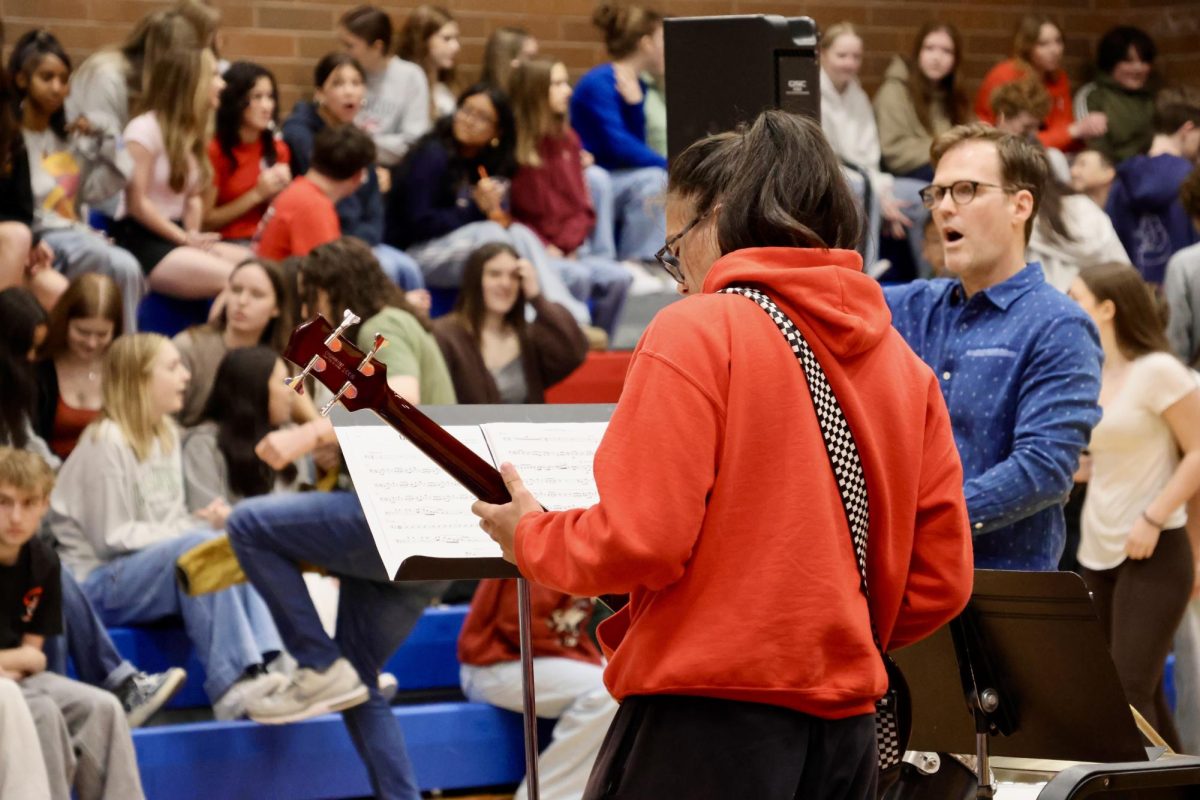Some of the songs on the album contain explicit content.
“Forever Howlong,” released April 4, 2025, finds Black Country, New Road in yet another state of reinvention.
It’s the U.K. group’s first studio album since Isaac Wood, their previous lead vocalist, stepped away in 2022. Rather than chase the almost sardonic intensity of their earlier work, they took a wide left turn into folk, chamber pop, and a dreamlike whimsy that feels entirely fresh yet unmistakably their own.
Produced by James Ford, the record is full of odd, beautiful arrangements — bands, recorders, softly woven harmonies — with vocal duties split between Tyler Hyde, Georgia Ellery, and May Kershaw.
It’s not a retreat so much as a reorientation towards something far stranger.
The result is a whimsically deranged ambience that feels like the soundtrack to a Grimm’s fairy tale chapter lost to time.
The album opens with “Besties,” a celebration of female friendship that hides vulnerability beneath deceptively upbeat instrumentation. Hyde’s vocals soar as the track builds to an emotional peak that feels like a moment of catharsis disguised as pop music. It’s immediately clear that this isn’t the same band that once thrived on post-punk angularity, but rather something more emotionally direct, yet keeping the same complexity.
“The Big Spin” follows with structural restlessness and lyrics that border on surrealism, weaving imagery of dismembered limbs and purple hair alongside peculiar predictions about lemon harvests. This track has a lot going on lyrically. While melodically unfocused, there’s something hypnotic in its strangeness that keeps pulling you back for another listen.
On “Socks,” the band wraps existential dread in meta-commentary, with the literal announcement of “Here comes the chorus!” before an explosive finale that somehow works perfectly. Anxiety has rarely sounded this beautiful, with instrumental layers that build and dissolve with remarkable precision.
“Salem Sisters” stands as an early album highlight, presenting a witch trial allegory that pivots between lush arrangements and haunting arpeggios. The vaudeville-like execution gives historical trauma an unexpected warmth. It’s perhaps their most direct composition to date, and also their most impactful, creating tension that resolves in unexpected ways as the story unfolds across carefully orchestrated movements.
Midway through, “Two Horses” finds Ellery narrating as a “faraway traveler” through what sounds like a soap opera set to indie-western fusion. The music builds with the narrative, creating tension that resolves in unexpected ways as the story unfolds across carefully orchestrated movements.
Not everything lands perfectly.
“Mary” offers a character study that feels incomplete, with its portrait of socially alienation beautifully delivered but never developing beyond initial impressions. It’s the album’s most frustrating missed opportunity, hinting at depths it never fully explores.
The band quickly rebounds with “Happy Birthday,” a passive-aggressive dismissal of unhappiness that cuts deeper with each listen. The refrain “people would give an arm and a limb to be where you are” transforms from platitude to menacing mantra against dramatically swelling instrumentation.
“For the Cold Country” emerges as the album’s centerpiece, building to its most massive arrangement as it explores vulnerability through medieval imagery. A knight removing their armor has never sounded so emotionally devastating, with each layer of instrumentation adding to the sense of exposure and release.
“Nancy Tries to Take the Night” showcases contemporary storytelling that occasionally meanders, with the music sometimes feeling subservient to narrative. Yet the sudden dropout of instruments creates a striking moment of absence that resonates long after the song ends.
The titular track “Forever Howlong” wanders perhaps too much, though it thematically ties the album together with recurring motifs from earlier songs as a kind of lyrical déjà-vu. More focused composition would have elevated its good material to great material, but there’s still plenty to appreciate in its sprawling ambition.
The album closes perfectly with “Goodbye (Don’t Tell Me),” which delivers some nice emotional closure and musical catharsis. The band demonstrates remarkable restraint before unleashing a final crescendo that feels genuinely earned rather than obligatory — a fitting end to an album that constantly subverts expectations.










